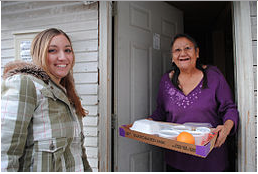The American value of individualism affects us all, but what happens when you are not able to express that value? This is a dilemma for older people subject to stereotypes of dependency. They face special challenges in striving for this ideal and feeling comfortable enough to accept help so that they can remain self-sufficient. In my last post, I explored some reasons why older people may not want to move in with their families. Given these cultural pressures, how do elders living on their own negotiate their need for care and autonomy?

Polls consistently show that older adults and aging baby boomers want to “age in place”—or remain in their homes independently for as long as possible. This arrangement, desired by ordinary people as a means of preserving autonomy and by policy makers who view this as a cost effective alternative to nursing homes, requires that seniors—often in conjunction with their families—patch together creative ways to support their independence.
The day-to-day managing of routine tasks like grocery shopping, doctor’s appointments, and household chores, usually necessitates a little help from a supportive web that includes family, friends, neighbors, and social service agencies. Family may help older relatives with chores, coordinate medical appointments, and pay for supplemental help when possible. Network studies have found that friends are especially good at providing emotional support and a sympathetic ear when life’s travails require someone to bear witness. And neighbors can pitch in with practical help, such as picking up a few things from the store when an older person has trouble leaving the house. For years I have observed how eighty-year-old Joe’s next-door neighbor has served as his link to the outside world whenever his swollen ankles and knees leave him homebound. She brings him a copy of The Daily News and groceries whenever he needs a few days to mend.
Beyond kin and friendship networks, senior centers provide a range of services to community-dwelling elders, though they are also usually the first candidates for budget cuts. A few older people I’ve met over the years regularly took advantage of the cheap but nutritious meals offered daily by a local senior center for a dollar, which saved them the hassle of cooking for one and the cost of eating out but also provided a little companionship. Nonprofit organizations that serve older adults, such as the Jewish Association Serving the Aging (JASA), offer comprehensive access to services that help older people deal with the challenges of living alone in an expensive, gentrified city like New York, including benefits screening for programs such as food stamps and Medicaid. As I walked past a Midtown Manhattan food pantry the other day and saw the line stretching a half-block long, filled with mostly Asian and Latino elders and their shopping carts waiting for donated potatoes, rice, and canned vegetables, I was reminded again of how crucial these stop gaps are for those struggling to remain independent in old age.
But in some cases, elders may go too far in keeping their family at bay due to fears of losing their independence if they reveal their physical or financial challenges. In my own research, I’ve found that some people feel so threatened by the prospect of moving in with family (or worse, a nursing home) and ashamed of asking for help that they sometimes go to great lengths to cover up health issues and other difficulties. It’s often only after a crisis that families learn of mounting problems. For example, after 83-year-old Dottie ended up hospitalized for a heart attack her daughter discovered that she had not seen a doctor besides her podiatrist for several years. In the absence of regular medical care, Dottie had improvised her own self-care measures such as weighing down a shopping cart with telephone books for support when she walked, rather than using a cane or walker. When Theresa, in her mid-70s, fell and twisted her ankle, her family discovered the severity of her dementia, which had eroded her ability to tell time and remember dates. Afterwards, she moved closer to where her brother lived.
How can we support elders so that reaching out for help doesn’t pose a threat to independence but rather ensures that a bad situation doesn’t get worse or become an unnecessary crisis? Perhaps the first step is recognizing that none of us can do it alone and that at every age we achieve self-reliance by drawing on a mix of social resources and supports.
Originally posted 8/4/14
Stacy Torres is an Assistant Professor in the Department of Sociology and associate at the Center for Social and Demographic Analysis at the University at Albany, State University of New York.

Comments